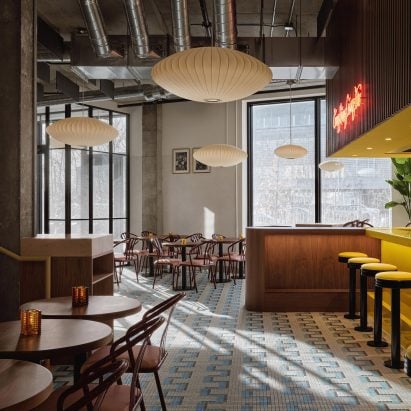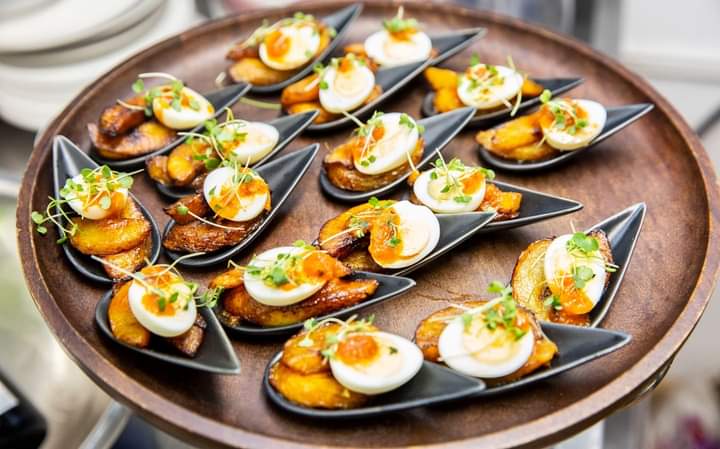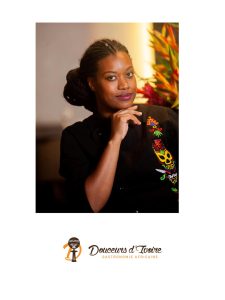
Paule Béké is a Franco-Ivorian chef and the founder of Douceurs d’Ivoire, a London-based culinary concept dedicated to reimagining Ivorian cuisine through a refined, modern lens. Drawing on her roots in Côte d’Ivoire, her training in France, and her culinary career across Europe, Paule brings ancestral techniques and bold flavours into contemporary dining experiences—from private chef services to immersive Afrofusion Dinners.
In this conversation, Paule shares her journey from corporate life to the professional kitchen, her inspirations growing up in a food-loving family, and her mission to elevate West African gastronomy on the global stage. She reflects on her time on MasterChef: The Professionals, the cultural storytelling behind her food, and how she’s passing on culinary heritage to the next generation.
- Paule, your culinary journey spans continents and cultures—from the Ivory Coast to France, and now London. How have these diverse environments shaped your cooking style?
Every place that I’ve lived, especially Ivory Coast, France and now London, has left a deep footprint on how I cook and how I see food. Growing up in Côte d’Ivoire, I was immersed in bold flavours, intuitive cooking, and a respect for fresh ingredients and tradition. Food was a lifestyle, healing and sharing. That foundation has never left me. In France, I learned precision, discipline, and the beauty of technique. It refined my approach, taught me to be consistent, to enhance my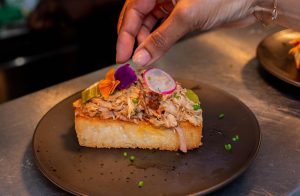 sense of structure and detail, and showed me how to elevate a dish while still keeping its soul intact. Now, in London, I find myself in a city that thrives on multiculture and creativity. It’s a place where I feel free to blend influences, push boundaries and reimagine what Ivorian cuisine can look like on a global plate. Each place has shaped me in a different way; but together, they’ve given me a unique voice as a chef. One that’s rooted, refined and constantly evolving.
sense of structure and detail, and showed me how to elevate a dish while still keeping its soul intact. Now, in London, I find myself in a city that thrives on multiculture and creativity. It’s a place where I feel free to blend influences, push boundaries and reimagine what Ivorian cuisine can look like on a global plate. Each place has shaped me in a different way; but together, they’ve given me a unique voice as a chef. One that’s rooted, refined and constantly evolving.
- Growing up with a father who was a Maître Rôtisseur and a mother passionate about traditional African cuisine, what were some early food memories that inspired you?
I can remember my dad, one day when mum was away, cooking fresh jumbo prawns he had caught the day before: it was only salt, garlic and pepper but oh so great a taste! I will always remember that, as it was a dad-daughter moment happening in our home kitchen and that led to my love for cooking seafood and fish. Another one is my mum and her love for land snails. We were in a restaurant and at that time I was about 9 years old and could not think about eating snail, as I found it disgusting, especially the big snails in Ivory Coast. And then came the chargrilled snail skewers platter with that vibrant green relish and smelling so good I gave it a try. I started loving snails right then. A funny fact is that one of my dad’s signature dishes was named after my mum’s love for land snails: “le cachet de madame” which is a vol-au-vent with snails and a green sauce – full of flavours! It was one of my first reappropriation dishes as a chef.
- You initially started your career in the corporate sector before returning to your culinary roots. Can you tell us about that transition and what sparked your decision to become a professional chef?
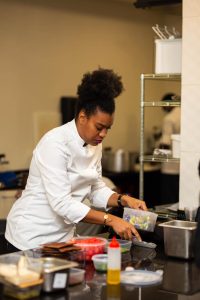 I just followed my calling. I have always been involved in hospitality with my father being a chef. My parents hosted parties a lot to welcome friends and family at home, so event organising is something I know well. It was natural for me to transition from corporate to the kitchen. The true calling came when I worked in a big electrics company that was putting off hiring me with an indefinite full-time contract, despite the good results in my work. then they dropped me without notice. I felt used and realised that giving my best to a company and working that hard would be better directed towards my own success than working for people that don’t recognise your worth and use you until they don’t need you anymore. That’s when I stopped and started to value my wellbeing and then created Douceurs D’ivoire.
I just followed my calling. I have always been involved in hospitality with my father being a chef. My parents hosted parties a lot to welcome friends and family at home, so event organising is something I know well. It was natural for me to transition from corporate to the kitchen. The true calling came when I worked in a big electrics company that was putting off hiring me with an indefinite full-time contract, despite the good results in my work. then they dropped me without notice. I felt used and realised that giving my best to a company and working that hard would be better directed towards my own success than working for people that don’t recognise your worth and use you until they don’t need you anymore. That’s when I stopped and started to value my wellbeing and then created Douceurs D’ivoire.
- Your company, Douceurs d’Ivoire, offers a refined take on West African gastronomy. How do you balance tradition with innovation in your catering and private chef services?
I don’t really see myself as balancing tradition and innovation, because Ivorian cuisine and its ancestral techniques already embody what we now call modern or innovative cooking. Methods like lacto-fermentation, sun-drying, plant-based preservation, saline curing and seasonal eating have been part of my food culture since I can remember – and for generations. Today, these are seen as cutting-edge in Western kitchens but, for us, they’ve always been natural and necessary. I like simple things, so for me, the balance comes from the cuisine itself, from my viewpoint. My role is to highlight the beauty and intelligence of these traditional practices and align them with the techniques I’ve gained from my professional culinary experience with that great chefs I have met. I focus on showcasing the ingredients, letting them shine, while honouring the heritage and bringing it into new contexts. It’s not about reinventing Ivorian cuisine; it’s about showing how forward-thinking it already is.
- The Afrofusion Dinner concept is about more than just food—it’s a cultural and social experience. What do you hope guests take away from attending one of these dinners?
The Afrofusion Dinner is more than just a meal: it’s a full cultural immersion into the heart of my Ivorian tradition. From the moment guests arrive, I want them to feel transported. They’re not just tasting Ivorian food – they’re stepping into our history, rhythm, and our way of gathering. Ivory Coast is famous for its hospitality.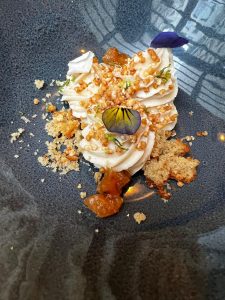
The dishes are deeply personal, inspired by family recipes, travels and regional specialties from attiéké to sauce graine or alloco, for instance. But what truly sets the experience apart is how the menu is brought to life through storytelling. I often invite a kora player, whose music and words guide guests through each course. He doesn’t just play, he tells the story behind the food, the ingredients, and the land they come from. It creates a sacred space, where food and culture dance together. My hope is that every guest leaves feeling connected, not just to the delicious food they had, but to the spirit of Côte d’Ivoire. If they walk away with a deeper appreciation for my interpretation of Ivorian / African culture, and maybe even a new story to tell, then I’ve done my job. Nothing else makes me happier than that feeling.
- As head chef at KATO, an East Asian restaurant, and chef-owner of Kassava in Paris, how do you navigate blending different culinary traditions in your work?
As I have been exposed to several culinary traditions since I was young, it comes naturally to me to juggle from one to another. My time in fine dining kitchens and 5-star hotels helped me widen my cultural palette. My love for travel and discovery helped a lot as well. So, I can work today on a bao project and concentrate tomorrow on an Ivorian restaurant opening just like that. My experience and curiosity helped me train to be flexible and get the understanding of flavours and food culture.
- You recently appeared on MasterChef The Professionals. How did the pressures and pace of the TV kitchen compare to your daily work in a restaurant?
A working kitchen is organised and well oiled. Even though it can be stressful and fast-paced during service, you have time to let the food cook at your pace. MasterChef the Pro was about getting the best in a very short time. The timing and surrounding environment makes it become surreal! I think I can speak for most of the contestants by saying that.
- What was it like interacting with the presenters and other contestants on MasterChef? Did you form any memorable connections?
Being on MasterChef was intense, emotional, and incredibly rewarding. As the only woman in my “heat”, I felt a strong sense of responsibility not just to represent myself, but to represent women in the culinary world, especially those bringing African cuisine to the forefront. It could be intimidating at times, but that also fuelled my determination. I knew I was there to show that Ivorian food and women’s voices in food, deserve a place on that stage. Although it might sound clichéd, women are still underrepresented. The whole team was very supportive and genuinely curious about my culture and techniques, which meant a lot. And, despite our differences, there was real respect among the contestants. We formed a bond through the pressure and passion, and I walked away with new friendships and a deeper belief in my craft. More than anything, it was a moment of pride to stand tall as a woman, as an Ivorian, and as a storyteller through food.
- How did you feel about your final placing in the competition, and what did you learn about yourself through the experience?
I was, of course, disappointed. When you enter a competition, you go in wanting to win. But I’ve come to realise that everything happens for a reason. Being part of MasterChef gave me something even more valuable than a title: clarity. It helped me understand my strengths, my boundaries, and what I truly want and don’t want in my professional journey. It was a moment of reflection as much as it was a challenge, and it helped me define my path with more purpose and confidence.
- Sustainability is a key passion for you. How do you incorporate sustainable practices into your cooking and business model?
Even though staying sustainable on a limited budget can be challenging, I make it a priority to leave as clean a footprint as possible. I follow a zero-waste approach in my kitchen, reusing ingredients in creative ways or giving them a new life as much as possible (something I learned while working in high-end kitchens, but which is also deeply rooted in traditional Ivorian cooking). That’s the true wonder of food: its ability to transform. In Côte d’Ivoire, we’ve long practiced ancestral methods of preservation and transformation, fermentation, salting, sun-drying, burying in sand, and smoking, to name a few techniques. These are now seen as ‘trendy’ in the Western world, but for us, they’ve always been part of the everyday cooking process. One beautiful example is the use of certain leaves to wrap and store cooked or raw food. They can keep it fresh for weeks without refrigeration. For me, rethinking sustainability isn’t about reinventing the wheel. It’s about reconnecting with ancient knowledge, honoring the resourcefulness and wisdom of my predecessors, and applying those principles in a modern kitchen. When you like what you do, you find every possible way to make it happen. Thats very simple.
- As a mother, how has cooking with your 7-year-old daughter influenced your perspective on food and family?
There’s a deep sense of pride and even relief in seeing my little one genuinely interested in the food from home. Not only does she enjoy it, but she also wants to be part of making it, which makes it all the more special. For me, passing on our food traditions to the next generation is everything. It’s how our work, our stories, and our identities live on. As long as it’s shared with empathy, good teaching, and a true love and respect for the ingredients and the land they come from, our culture won’t disappear. This is the legacy handed down from my parents, and from theirs before them, and now I get to see it take root in my daughter.
- Finally, you’ve expressed a desire to make Ivorian cuisine as popular in the UK as Chinese or Italian food. What steps do you think are needed to elevate African gastronomy on the global stage?
To elevate Ivorian and, more broadly, African gastronomy on the global stage, we need a mix of cultural pride, education, visibility and consistency. It starts with telling our stories through food. People connect with dishes when they understand the traditions, ingredients and emotions behind them. So, it’s about more than just serving a plate, it’s about sharing a piece of Ivorian history and identity when I showcase my dishes. We also need more representation in the right spaces: mainstream media, food festivals, culinary schools and high-end restaurants. Just like Chinese or Italian cuisines found their way into people’s homes, Ivorian food must become more accessible: from casual dining spots to supermarket shelves. But we must do this without compromising the authenticity of our flavours. I have already seen the French raving about an absolute Ivorian delicacy :”foutou sauce graine”, which is fufu and palm nut stew.
Finally, collaboration is key between chefs, producers, farmers and storytellers; to build a unified movement that champions African ingredients, techniques and values. If we keep leading with passion, pride, and quality, there’s no doubt Ivorian cuisine will take its rightful place on the global table.

